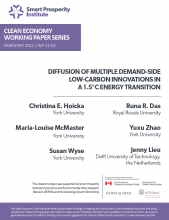By Christina Hoicka, Runa R. Das, Maria-Louise McMaster, Yuxu Zhao, Susan Wyse and Jenny Lieu
The rapid diffusion of low-carbon innovations has been identified as a key strategy for maintaining average global temperature rise at or below 1.5°C. Diffusion research tends to focus on a single sector, or single technology case study, and on a small scope of factors that influence innovation diffusion.
This paper describes a novel methodology for identifying multiple demand-side innovations within a specific energy system context and for characterizing their impact on socio-technical energy systems. This research employs several theoretical frameworks that include the Energy Technology Innovation System framework to develop a sample of innovations; the Sustainability Transitions framework to code innovations for their potential to impact the socio-technical system; the energy justice framework to identify the potential of innovations to address aspects of justice; and how characteristics of innovations are relevant to innovation adoption. This coding and conceptualization creates the foundation for the future development of quantitative models to empirically assess and quantify the rate of low-carbon innovation diffusion as well as understanding the broader relationship between the diffusion of innovations and socio-technical system change.
This research found that the majority of the innovations being offered to energy users in Ontario have incremental rather than disruptive characteristics, and general rather than technology-specific policy supports. The innovations also tend to have strong legitimacy support through discourse framing and system actors. Furthermore, through correlation analysis, this research found that innovations with the potential to lead to system decarbonization are associated with lower rates of diffusion, while innovations with strong economic policy support and legitimacy support through discourse framing are associated with higher rates of diffusion.
READ THE WORKING PAPER: Diffusion of Multiple Demand-Side Low-Carbon Innovations in a 1.5°C Energy Transition
The Clean Economy Working Paper Series disseminates findings of ongoing environmental and clean economy work conducted by researchers from a range of disciplines. These working papers are meant to make results of relevant scholarly work available in a preliminary form. Although these papers have not undergone a peer-review process, they meet general standards of scholarly excellence. The views expressed in these working papers are those of the authors and do not necessarily reflect the opinions of Smart Prosperity Institute.



